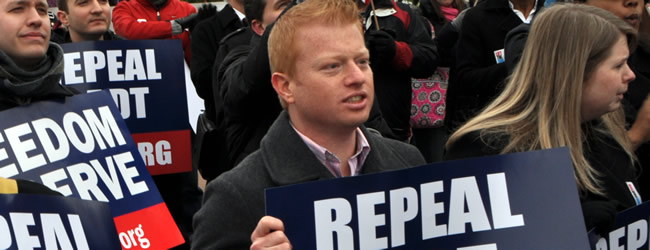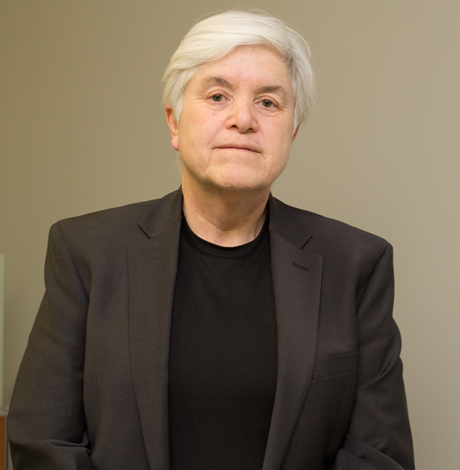Living
Gay Hill staffer remembered for humor, dedication
Crowe, 29, succumbed to staph infection

The booming voice of Katy Perry accompanying a techno-dance beat of her song “Firework” jolted Kyle Murphy from sleep a couple months ago at 3 a.m.
Curious about the disturbance, Murphy arose from bed to find his best friend and roommate Christopher Crowe dancing on top of their kitchen island.
“I didn’t know what was going on,” Murphy said. “He had brought some friends home and the first thing I saw was him standing on the island in our kitchen dancing to Katy Perry. He was kind of the life of the party.”
For Murphy, who had known Crowe for more than five years since they interned together at the Gay & Lesbian Victory Fund, the memory represents Crowe’s over-the-top personality and willingness to go to great lengths to entertain others.
“Somebody had collected some quotes he used to say in his office, and one of them was ‘I say ‘no’ to drugs, and that’s it,'” Murphy said. “And that kind of, I felt like, summed up his personality.”
Crowe died last week at the Washington Hospital Center from a staph infection that damaged his heart after he contracted meningitis last summer.
Crowe, 29, who was gay, served as president of the LGBT Congressional Staff Association and as a staffer for Rep. Eddie Bernice Johnson (D-Texas). The death of the Kentucky native struck many Capitol Hill staffers and LGBT advocates with grief and prompted fond recollections of his life this week.
Johnson issued a statement expressing sorrow over the loss of her longtime staffer and sympathy for his family and loved ones.
“He was respected by his colleagues for his professionalism; he was beloved by many for his generous spirit and good humor,” Johnson said. “He was a person who enjoyed life and always had a smile to share. He never met a stranger.”
Many friends who worked with him on Capitol Hill and in LGBT advocacy had similar recollections of Crowe’s outgoing personality, which they said enabled him to make fast friends.
Marcus Paulsen, who’s gay and an administrative coordinator for the nonprofit group Community Wealth Ventures, said Crowe had a unique way of making others feel at ease.
“He was always laughing, and it didn’t matter if you told the dumbest joke,” Paulsen said. “He always would find it funny and could find something hysterical about it.”
A Dallas native, Paulsen said Crowe helped him obtain a position as an intern, and later a staffer, in Johnson’s office, where the two worked together for a year-and-a-half.
Paulsen recalled a time in December 2009 when he and Crowe participated in a retreat for staffers in Johnson’s office in Texas. Identifying the experience as one of his fondest memories of Crowe, Paulsen said people he knew from his home state easily made friends with Crowe.
“For me, it was kind of two worlds coming together: my D.C. life and my Texas life,” Paulsen said. “I wasn’t really sure how people would react to some of my D.C. friends and Chris, but he just had this way of becoming really close with people and everybody just absolutely adored him.”
Jason Mida, the Victory Fund’s vice president of development, knew Crowe from his days as an intern at the organization in 2005 and said Crowe had a unique way of drawing others to him.
“It didn’t matter who you were, it didn’t matter what your political affiliation was,” said Mida, who’s gay. “People were drawn to Chris. He was a ball of life and people wanted to be around him because you just felt better. You felt better about yourself; you felt better about things in general when he was around.”
Scott Simpson, press secretary of the Leadership Conference on Civil and Human Rights, knew Crowe from working together on the LGBT Congressional Staff Association and said he admired the confidence that gave Crowe the ability to speak with anyone.
“He had an ease about dealing with any range of people,” Simpson said. “Chris wouldn’t think twice about calling up the highest-level person in an agency or to the lowest-level person.”
Simpson said Crowe’s care for others enabled him to stay engaged with friends even as he struggled with meningitis for several months.
“This was a man who was in the emergency room,” Simpson said. “He was sending e-mails, text messages, asking how things are going, asking if he can help. If you didn’t know that Chris was sick, if you weren’t informed about it, people never knew.”
While always eager to have a good time with others, Crowe was also known among his friends as a passionate worker in both legislative affairs and LGBT advocacy.
Murphy, a communications specialist for the National Minority AIDS Council, recalled that Crowe’s dedication enabled him to rise quickly to become a high-level staffer for Johnson and to get elected as president of LGBT Congressional Staff Association.
“Everything that I heard about him was that he was amazing — not the greatest writer — but he had dyslexia, but he worked through that very well and didn’t let anything hold him back,” Murphy said.
Simpson recalled his days as president of the LGBT Congressional Staff Association before he left Capitol Hill when Crowe served as his deputy. The two worked on recreating the association after it had long been dormant.
Even though their work in recreating the association involved activity on rewriting bylaws and other less-than-exciting tasks, Crowe found ways to make the work enjoyable.
“Chris made people come to these meetings and actually enjoy themselves and actually laugh,” Simpson said. “He understood that in order to commit people to make change, they had to have a good time and that, I believe, was his secret weapon.”
As evidence of Crowe’s jovial personality, Simpson noted that Crowe would only refer to him as “Girl!” during the course of their work together. Simpson joked that he didn’t know if Crowe actually knew his name.
In his days as a Victory Fund intern, Mida said Crowe was dedicated and passionate about LGBT advocacy. He took a personal interest in working to elect Vivian Paige, a lesbian who ran in 2005 for city treasurer in Norfolk, Va.
“I remember how visibly upset he was when Vivian lost that night,” Mida said. “We’d only been there a few days, but he was so invested. I think that across the board —whether it was his work and whether it was relationships with folks — he immediately became invested in folks, and as a result, people were invested in him.”
Among the activities that friends cited as Crowe’s favorite was travel. In his work on foreign affairs issues for Johnson, Crowe would often take opportunities to go abroad as part of his work as a congressional staffer.
Murphy recalled that Crowe traveled to Dubai and Abu Dhabi in the United Arab Emirates as part of his work for Johnson, which Murphy said gave Crowe “a travel bug.”
Among the trips that Murphy took with Crowe was an expedition with him and his mother on a Key West cruise in 2009.
“We were both redheads and so we just kind of looked like brothers, so we just starting telling everybody that we were brothers from that cruise ship on — and I referred to his mom as ‘Mama,'” Murphy said.
Murphy recalled that he and Crowe went to Peru in 2008 and Crowe traveled with other friends to Bangkok and Hong Kong. Before Crowe’s death, Murphy said his friend had asked him to put together another trip together.
But dreams for travel and ambitions for further work on LGBT issues and politics were cut short. Murphy, who was present at the hospital where Crowe died, was the first of his friends to know.
“His mom had called me and was kind of frantic telling me the doctors had come out of the operating room saying they didn’t know if he was going to make it, so I rushed to the hospital,” Murphy said. “By the time I got there, he had passed.”
Murphy said in the operating waiting room he encountered Crowe’s mother, who was crying and at first unable to speak, but then said, “We lost him.” Murphy said the news was devastating, but he took on the responsibility of sending e-mails to Crowe’s friends and fellow Hill staffers to inform them.
Paulsen was one of the recipients of the e-mails and, in a state of shock, said he immediately left work upon hearing the news.
“I walked all the way over to Chris’ apartment to be with his roommate and family,” Paulsen said. “At first I couldn’t process it, but it was just very sad.”
Another e-mail recipient, Simpson said Crowe’s death came as a surprise because those who knew him thought he could just “smile through” his disease to become healthy.
“It didn’t seem real,” Simpson said. “I knew that Chris was sick, but it was never always clear that it would be this bad.”
Simpson observed that deaths at a young age are relatively uncommon in the younger generation of gay men — unlike what older gay men faced during the AIDS crisis of the 1980s and early ’90s.
“We’re not used to death,” Simpson said. “He was the first of my peers to pass on. If you talk to gay men who are in their 40s and 50s, they had peers pass away all the time. That was one of those moments that I started to understand that this was just a hint of what gay men who were around in the ’80s were going through.”
Still, the memory of Crowe and his sparkling personality remain an inspiration for those who knew him.
Paulsen said he would always remember Crowe’s ability to find greater potential in others.
“He found some talents in me when we worked together and he made sure to always bring those up to the congresswoman or the chief of staff,” Paulsen said. “I think that’s what I’ll take from him — to try to make sure I see these things that might not be visible to everybody else and make sure that they’re aware of some of their talents.”
Murphy, who said he’s often a wallflower in social situations or nervous around guys he likes, expressed admiration for what he said was Crowe’s ability to embrace every situation head on and would try to emulate that approach to life.
“I think that’s something we and all of his friends really appreciated and his family, too,” Murphy said. “It’s something we’ll all probably try to live up to.”
For Simpson, Crowe’s memory inspires him to be proud of who he is and helps him stay grounded.
“Chris was aware of who he was and he fucking loved it, and played it up,” Simpson said. “Chris just knew that you have to be OK with who you are, but you have to be not just OK with it, but you have to own it and love it.”
A memorial service for Crowe is set to take place on Thursday at 12 pm in Room LJ-119 in the Jefferson Building at the Library of Congress. The Congressional LGBT Equality Caucus and the LGBT Congressional Staff Association are hosting the event. House chaplain Rev. Daniel Coughlin is set to officiate over the service.

As the days grow longer and buyers re-emerge from winter hibernation, the spring market consistently proves to be one of the strongest times of year to sell a home. Increased inventory, motivated buyers, and picture-perfect curb appeal make it a prime window for homeowners ready to list.
The good news? Preparing your home for spring doesn’t require a full renovation or a contractor on speed dial. A few thoughtful, cost-effective updates can dramatically elevate your home’s appeal and market value.
Here are smart, inexpensive ways to get your property market-ready:
Fresh Paint: The Highest Return on a Small Investment
Few improvements transform a home as quickly and affordably as paint. Neutral tones remain the gold standard, but today’s buyers are gravitating toward warmer tan hues that create an inviting, elevated feel without overwhelming a space. Soft sandy beiges and warm greige-leaning tans provide a clean backdrop that photographs beautifully and allows buyers to envision their own furnishings in the home.
Freshly painted walls signal care and maintenance — two qualities buyers subconsciously look for when touring properties.
Removable Wallpaper: Style Without Commitment
For homeowners wanting to introduce personality without permanence, removable wallpaper offers a stylish solution. A subtle textured pattern in a powder room, a soft botanical print in a bedroom, or a modern geometric accent wall can add depth and character. Because it’s easily removed, it appeals to both sellers and buyers — creating visual interest without long-term risk.
Upgrade Light Fixtures for Instant Modernization
Outdated lighting can age a home instantly. Swapping builder-grade fixtures for modern, streamlined options is one of the simplest ways to refresh a space. Consider warm metallic finishes or matte black accents to create a cohesive, updated look. Proper lighting not only enhances aesthetics but also ensures your home feels bright and welcoming during showings.
Elevate Curb Appeal: First Impressions Matter Most
Spring buyers often decide how they feel about a home before they ever step inside. Refreshing curb appeal doesn’t require major landscaping. Simple updates such as fresh mulch, trimmed shrubs, seasonal flowers, a newly painted front door, and updated house numbers can dramatically improve first impressions. Power washing the driveway and walkways also delivers a clean, well-maintained appearance for minimal cost. Even if you don’t have a curb to appeal- think potted plants on your patio, balcony and change out your door mat.
Deep Clean & Declutter (Seriously, It Matters)
A deep, top-to-bottom cleaning is basically free and one of the most impactful things you can do. Scrub floors, windows, grout, baseboards, appliances, bathrooms, and everything in between. Don’t forget to clean windows inside and out — natural light is a huge selling point. Declutter by packing up excess stuff, clearing off countertops, and minimizing personal items so buyers can see the space, not your life.
Let the Light Shine
Make your home feel bright and inviting by cleaning windows, opening blinds, and replacing dark or dated light fixtures with contemporary, budget-friendly options. Swapping in LED bulbs offers brighter light and lower utility costs — a small change that buyers appreciate. Pro tip: I always recommend removing widow screens to allow as much light in as possible
Neutralize Scents
Make sure the home smells fresh. Neutralizing odors — whether from pets, cooking, or moisture — creates a clean, welcoming atmosphere. Light natural scents like citrus or subtle florals can be inviting during showings. Think of how your favorite hotel smells and go for that.
Spring market rewards preparation. By focusing on high-impact, low-cost improvements, sellers can position their homes to stand out in a competitive environment. With thoughtful updates and strategic presentation, homeowners can maximize both buyer interest and potential sale price — all without overextending their renovation budget.
As activity increases and inventory begins to rise, now is the time to prepare. A little polish today can translate into significant results tomorrow.
Justin Noble is a Real Estate professional with Sotheby’s International Realty Servicing Washington D.C., Maryland, and the beaches of Delaware.
Advice
Dry January has isolated me from my friends
Is it possible to have social life without alcohol?

Dear Michael,
Some of my friends and I decided to do Dry January.
The six of us are a posse, we’ve been friends for years. Many boyfriends and even a husband or two have come and gone but we get together all the time and travel together.
I think we all agreed that drinking is too big a part of our social lives and thought we’d give Dry January a shot.
So … I am feeling better and it’s only been three weeks.
I’ve actually lost a little weight, and it’s nice not to wake up with a hangover four mornings a week. I’m pushing 40 and no surprise, my body feels relieved.
But, I’m also the only one of us who is still doing it.
Which means they are all going out and I am not. So I am feeling lonely.
I could join them in going out but first of all, I don’t really want to hang out with them when they’re drunk and I’m trying to be alcohol free; and also, there’s a part of me that is afraid I will give in to temptation and have a drink. And then it will be back to business as usual.
But, I spent this past weekend, and every night this week, alone.
All of this has me thinking: what do I do in February? I really don’t want to start drinking again.
But, if I don’t, how do I stay part of my friend group? If they’re buzzed (or drunk) and I’m not, am I still going to fit in?
I’m disappointed in my friends. We were all in this together, I thought, but one thing after another came up for them.
Some special event where “everyone was drinking,” a work dinner where “I didn’t want to deal with everyone’s questions about why I wasn’t drinking,” “too much work stress not to have a martini,” etc. In the end they were all laughing about it and now they’re basically poking fun at me and essentially betting how long I will last. That doesn’t feel good. It’s like the whole thing was a whim or a joke to them.
Also, heavy alcohol use is pretty typical of our community. If I’m not drinking then how do I have a social life?
Appreciate your thoughts.
Michael replies:
It can be hard to be different. For example, to be gay in a straight world, or not to drink in a world where alcohol plays such a big part.
I’m a believer in living in a way that respects whom you actually are. This means doing what you think is important to do, even when there are consequences you don’t like. Only you can decide the boundary where the consequences of your living with integrity become intolerable.
Yes, many gay men drink a lot. So if you decide you don’t want to hang out where alcohol is involved, you will be reducing your options for socializing.
Some possibilities:
- Discuss this situation with your friends. Ask them if they’re willing to spend some time with you and without alcohol. (Not all the time — that would be way too much to ask, given that they clearly enjoy drinking.) Perhaps if you explain why your request is important to you, they’ll be willing to lean in your direction at least some of the time. That they’re now mocking you for not drinking suggests I am a bit too optimistic about this possibility. But who knows? And, what have you to lose by asking?
- See if you can tolerate hanging out with people who are drinking without picking up a drink yourself, and if you can actually enjoy such interactions.
- Start looking for some new friends. There are, in fact, lots of gay men in this world whose social lives don’t revolve around alcohol (or other substances.)
On a separate but related note: given your fear that you will start drinking again, and your concerns about navigating life without alcohol, might you consider Alcoholics Anonymous to get some support?
I’ve seen AA and other 12-step groups help many friends and clients, and I think they work in two main ways.
First, attending meetings gives you support and a feeling of community. You’ll meet others who are working to be sober, hear their stories and share your own struggles with them. You’re likely to feel less alone in your effort to stop drinking, learn tools for staying sober, and make friends you can reach out to when you’re feeling vulnerable. You’ll also have a sponsor, your guide and advocate in the program, whom you talk with regularly.
Second, the program lays out “12 steps” of recovery that are a path to greater self-awareness and personal growth. Like good psychotherapy, the steps give you a framework for looking at your behavior patterns and taking responsibility for yourself.
If you are intrigued, the best way to learn more is to attend several 12-step meetings. There are many in our area, including gay groups (for example, the Triangle Club.) As I mentioned, if you do get involved in AA, a side benefit is that you’re likely to make some new friends who share your desire to build a life without alcohol.
Of course, making new friends does not have to mean cutting off your posse. But if you’re changing in ways that make them less of a great fit, it would be great to find some new folks who might be more on your wavelength to connect with.
Michael Radkowsky, Psy.D. is a licensed psychologist who works with couples and individuals in D.C., Maryland, Virginia, and New York. He can be found online at michaelradkowsky.com. All identifying information has been changed for reasons of confidentiality. Have a question? Send it to [email protected]
Real Estate
2026: prices, pace, and winter weather
Lingering snow cover, sub-freezing temperatures have impacted area housing market

The D.C. metropolitan area’s housing market remains both pricey and complex. Buyers and sellers are navigating not only high costs and shifting buyer preferences, but also seasonal weather conditions that influence construction, inventory, showings, and marketing time.
Seasonality has long affected the housing market across the U.S. Activity typically peaks in spring and summer and dips in winter; however, January and February 2026 brought unusually cold spells to our area, with extended freezing conditions.
Persistent snow and ice-covered roads and sidewalks have gone for days, and in some cases weeks, before melting. While snow accumulation normally averages only a few inches this time of year, this winter saw below-normal temperatures and lingering snow cover that has significantly disrupted normal activity.
Rather than relying on neighborhood teenagers to shovel snow to make some extra money, the “snowcrete” has required ice picks, Bobcats, and snow removal professionals to clear streets and alleys, free our cars from their parking spaces, and restore availability of mass transit.
These winter conditions have had an adverse impact on the regional housing market in several ways.
- Construction slowdown: New builds and exterior improvements often pause during extended cold, resulting in delayed housing starts when we need affordable housing in the worst way.
- Listing preparation: Cleaning crews, sign installers, photographers, and stagers with trucks full of furniture may be unable to navigate roads and need to postpone service.
- Showings and open houses: Simply put, buyers are less inclined to schedule visits in hazardous conditions. Sellers must ensure walkways and parking areas are clear and de-iced and be able to vacate the property while viewings are taking place.
- Inspection and appraisal delays: Like buyers and sellers, ancillary professionals may be delayed by unfavorable weather, slowing timelines from contract to close.
- Maintenance and repairs: Properties with winter damage (e.g., ice dams or frozen pipes) may experience repair delays due to contractor availability and supply chain schedules. Snow and cold can also affect properties with older and more delicate systems adversely, leading some sellers to delay listing until better conditions arrive.
- Availability of labor: Increasingly, construction, landscaping, and domestic workers are reluctant to come into the District, not because of ice, but because of ICE.
Overall, the District has shown a notable increase in days on the market compared with past years. Homes that once sold in a week or less are now often listed for 30+ days before obtaining an offer, especially in the condominium and mid-range house segments. While part of this shift can be attributed to weather and climate, interest rates, uncertain employment, temporary furloughs, and general economic conditions play key roles.
Nonetheless, we continue to host some of the region’s most expensive residences. Historic estates, including a Georgetown mansion that sold for around $28 million, anchor the luxury segment and reflect ongoing demand for premium urban property.
But even in this high-end housing sector, marketing strategies are evolving based on seasonal realities. Price reductions on unique or niche properties, such as undersized or unconventional homes, reflect a broader market adjustment where competitive pricing can shorten selling time.
For example, a beautifully renovated, 4-story brick home with garage parking and multiple decks that overlook the Georgetown waterfront sold in early February for 90 percent of the list price after 50 days on the market.
At the other end of the spectrum, a 2-bedroom investor-special rowhouse in Anacostia only took eight days to sell for under $200,000, down 14 percent from its original list price. In addition, four D.C. homes took more than 250 days to sell, including an 8-bedroom rooming house that was on the market for 688 days and closed after a 23 percent downward price adjustment.
Some frustrated sellers are simply taking their homes off the market rather than dropping prices below their mortgage balances, although we are beginning to see the resurgence of short sales for those who must sell.
Condominiums and cooperatives offer many opportunities for buyers and investors, with 1,100 of them currently on the market in D.C. alone. List prices run the gamut from $55,000 for a studio along the Southwest Waterfront to nearly $5 million for five bedrooms, four full baths, and 4,400 square feet at the Watergate.
So, while Washington metro area prices remain high, the pace of sales now reflects both seasonal and economic realities. Homes taking longer to sell, in part caused by elements of winter, signal a shifting market where buyers can take more time to decide which home to choose and have a better negotiating posture than in recent years.
Accordingly, sellers must continue to price strategically, primp and polish their homes, and prepare for additional adverse circumstances by reviewing fluctuating market conditions with their REALTOR® of choice.
Valerie M. Blake is a licensed Associate Broker in DC, MD & VA with RLAH @properties. Call or text her at (202) 246-8602, email her at [email protected] or follow her on Facebook at TheRealst8ofAffairs.



















